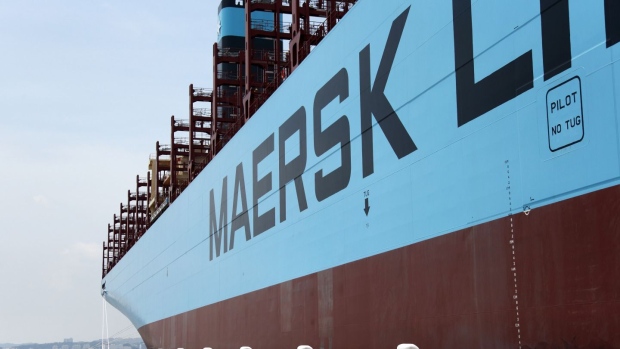Aug 15, 2019
Shipping Giant Expects Choppy Seas Ahead for World Economy
, Bloomberg News

(Bloomberg) -- Want to receive this post in your inbox every day? Sign up for the Terms of Trade newsletter, and follow Bloomberg Economics on Twitter for more.
We’re gonna need a smaller boat.
That’s one way to interpret the message from Maersk, the world’s largest shipping line, as it announced earnings Thursday with a subtle warning about the outlook for trade and possibly weaker demand growth for containers.
First came the good news: The Copenhagen-based company, which controls a fifth of the globe’s container fleet, said demand worldwide grew by about 2% in the second quarter from a year earlier — in line with its expected full-year growth of 1-3%. Profit beat analysts’ expectations. Chief Executive Officer Soren Skou said the company is managing the trade turmoil quite well so far. The stock jumped.
Then came the bad news, stemming from U.S. President Donald Trump’s import taxes on Chinese goods and Beijing’s retaliation. “The impact of the newly imposed tariff hike is expected to be significant for the U.S.-China bilateral trade and could in isolation remove up to 0.5% of global container demand in 2019 and 2020, and when U.S. tariffs on additional $300 billion is implemented later in the year, it could result in a reduction of up to 1% in 2020,” the company said.
A bite to demand of 0.5%-1% doesn’t sound that painful unless you consider that expectation for 2019 worldwide container growth is just 1%-3%.
All the unknowns about tariffs are hurting the shipping industry and the global economy more broadly, sending stocks and bond yields tumbling this week. Recession fears are rising in the U.S., Germany and the U.K., and trade hubs like Singapore and Hong Kong are on the edge of downturns. Meanwhile, the U.S. and China remain far apart on the substance of any deal. Beijing just announced plans to retaliate imminently against the 10% tariffs on about $110 billion of Chinese imports that Trump announced earlier this week.
“There is a lot of uncertainty,” particularly about the U.S. and China, Maersk’s Skou told Bloomberg Television. “Right now there’s not much that suggests a deal will be done anytime soon. It seems to be going in the other direction.”
The bottom line from Maersk’s vantage point: We probably haven’t seen the worst of this storm yet.
Charting the Trade War
Twenty-four product categories — encompassing imports worth $1.9 billion — were dropped off Trump’s new China tariff lists published Tuesday. Newly exempted items include skinned haddock fillets, booster seats and radioactive elements.
Today’s Must Reads
- Cooler heads | Japan and South Korea appeared to ease tensions in a trade dispute as two of Asia’s largest economies try to resolve a long-running feud about Japan’s 1910-45 occupation.
- Picking sides | The Trump-Xi trade war is forcing the world’s gadget makers to split along U.S.-Chinese lines, while tech giants like Huawei ‘de-Americanize’ their own supply chains.
- Pelosi’s peace | The House Speaker is threatening to block any trade agreement between the U.S. and the U.K. if Brexit jeopardizes the accord that ended the Northern Ireland conflict.
- Trade war winner | In a world where many companies are hurting from the U.S.-China trade battle, agricultural trader Olam International in Singapore calls the spat a boon for business.
- India’s slowdown | The nation’s trade deficit narrowed as imports fell for a second straight month, a sign of a deepening slowdown that the central bank is fighting with interest-rate cuts.
Economic Analysis
- Weakness spreads | Germany’s economy is under fire as exporters suffer.
- Short-lived delight | Trump’s tariff delay may push currency traders to hedge.
Coming Up
- Aug. 16: EU trade balance
Like Terms of Trade?
Don’t keep it to yourself. Colleagues and friends can sign up here. We also publish Balance of Power, a daily briefing on the latest in global politics.
For even more: Subscribe to Bloomberg All Access for full global news coverage and two in-depth daily newsletters, The Bloomberg Open and The Bloomberg Close.
How are we doing? We want to hear what you think about this newsletter. Let our trade tsar know.
--With assistance from Eddie Spence and Christian Wienberg.
To contact the author of this story: Zoe Schneeweiss in London at zschneeweiss@bloomberg.net
To contact the editor responsible for this story: Brendan Murray at brmurray@bloomberg.net
©2019 Bloomberg L.P.


